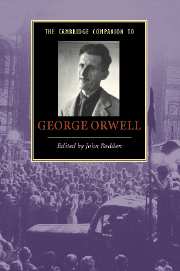Book contents
- Frontmatter
- 1 A political writer
- 2 Orwell and the biographers
- 3 Englands His Englands
- 4 The truths of experience: Orwell’s nonfiction of the 1930s
- 5 The fictional realist: novels of the 1930s
- 6 Orwell’s essays as a literary experience
- 7 ‘My country, right or left’: Orwell’s patriotism
- 8 Orwell and the British Left
- 9 Orwell, anti-Semitism and the Holocaust
- 10 Orwell, Socialism and the Cold War
- 11 Animal Farm: history as fable
- 12 Nineteen Eighty-Four: context and controversy
- 13 Orwell, the academy and the intellectuals
- 14 Orwell for today’s reader: an open letter
- 15 George Orwell: a bibliographic essay
- 16 Why Orwell still matters
- Further reading
- Index
4 - The truths of experience: Orwell’s nonfiction of the 1930s
Published online by Cambridge University Press: 28 July 2007
- Frontmatter
- 1 A political writer
- 2 Orwell and the biographers
- 3 Englands His Englands
- 4 The truths of experience: Orwell’s nonfiction of the 1930s
- 5 The fictional realist: novels of the 1930s
- 6 Orwell’s essays as a literary experience
- 7 ‘My country, right or left’: Orwell’s patriotism
- 8 Orwell and the British Left
- 9 Orwell, anti-Semitism and the Holocaust
- 10 Orwell, Socialism and the Cold War
- 11 Animal Farm: history as fable
- 12 Nineteen Eighty-Four: context and controversy
- 13 Orwell, the academy and the intellectuals
- 14 Orwell for today’s reader: an open letter
- 15 George Orwell: a bibliographic essay
- 16 Why Orwell still matters
- Further reading
- Index
Summary
'It is not easy to get hold of any facts outside the circle of one's own experience, but with that limitation I have seen a great deal that is of immense interest to me. . . . I hope I shall get a chance to write the truth about what I have seen. The stuff appearing in the English papers is largely the most appalling lies.'
Letter to Victor Gollancz (Barcelona, 9 May 1937)In the decade following his demoralised return in 1927 from service with the colonial police in Burma, George Orwell quite determinedly widened his circle of experience. Afflicted with a condition of 'bad conscience' in Burma, he explains, he was driven by the need to escape 'not merely from imperialism but from every form of man's dominion over man. I wanted to submerge myself, to get right down among the oppressed, to be one of them and on their side against their tyrants' (148). This feeling dictated the kinds of experience he would pursue: living on the rough with tramps and beggars in England; menial work in the cellars of fancy Parisian restaurants; wandering the streets of poverty in England's depressed North; fighting with the Catalonian workers' militia during the Spanish Civil War. Although Orwell recalls embarking on this programme out of a commitment to 'failure' - 'Every suspicion of self-advancement . . . seemed to me spiritually ugly, a species of bullying' - these ventures paradoxically inaugurated his success as a nonfiction writer: the authority of direct experience strengthened the impression of truth in his reportage about circles of social and political life remote from most of his readers.
- Type
- Chapter
- Information
- The Cambridge Companion to George Orwell , pp. 43 - 58Publisher: Cambridge University PressPrint publication year: 2007
- 3
- Cited by

